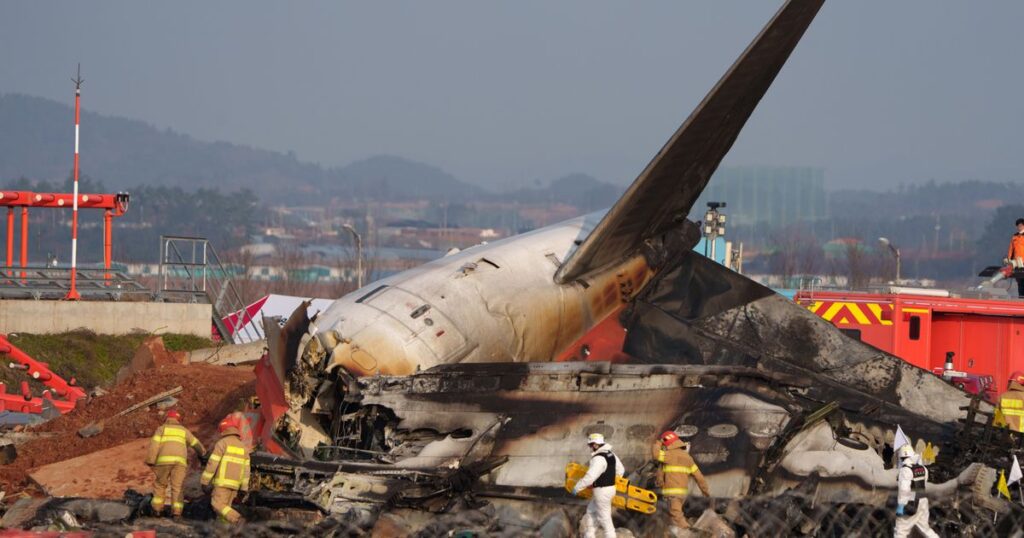MUAN, South Korea — South Korean officials on Saturday abruptly canceled the release of an intermediate report into the deadly crash of a Jeju Air passenger jet, after relatives of the victims disrupted a news conference, saying that the report was inadequate.
The confrontational scene unfolded after officials had earlier briefed the families privately on the latest stage of the investigation. The officials were planning to publicly release some findings from an analysis of the engines on the Boeing 737-800 that crashed Dec. 29, killing 179 of the 181 people on board.
A lawyer for the relatives, who saw the officials’ presentation in the private meeting, said the investigators had found no fault with the engines and instead appeared to blame birds — which struck the engines minutes before it made an emergency landing — and the plane’s pilots prematurely.
“The families did not get an adequate explanation,” said Pillkyu Hwang, the lawyer, speaking at a lectern in the Muan International Airport where the investigators of the crash had been expected to give their report. “In fact, depending on how you look at it, it kind of puts all the blame on the dead birds and the dead pilots,” he said, without specifying what details officials gave about the pilots’ actions.
“Of course, that may be the outcome of the investigation. But that requires tremendous rigor and very careful wording. And something came out that wasn’t careful at all,” Hwang said.
The relatives’ delegation said in a statement that the framing of the report could imply that final conclusions had been reached, when the crash was still under investigation. Many relatives said they feared the report could be misconstrued by the news media as being more definite than it truly was.
The Transport Ministry distributed copies of its report to journalists as they waited in a meeting room for the news conference to begin. Kim Byung-chae, a ministry spokesperson, said the report would not officially be made public until the start of the briefing.
But after the families burst in, shouting objections, the news conference was canceled. Officials took the copies back, declaring that the report had not been issued.
Jeju Air Flight 2216 landed on its belly after reporting a bird strike and issuing an emergency call. The plane overran the runway and struck a concrete berm that housed navigation aids, bursting into a deadly fireball. Only two people — flight attendants at the back of the plane — survived.
The cause of the disaster, the deadliest plane crash on South Korean soil, is still being investigated, hampered by the absence of a crucial piece of evidence: Flight recorders, known as black boxes, stopped recording for about the final four minutes of the flight.
Investigators have previously disclosed that bird feathers were found in both engines of the plane, but have not addressed their role in the disaster. The report expected Saturday was about the engines, which were manufactured by CFM International, a joint venture between GE Aerospace and Safran Aircraft Engines.
The start of the news conference was repeatedly postponed as reporters were told investigators were still speaking to the relatives in the nearby terminal building.
After about an hour of postponements, chaos erupted in the room where the reporters waited. Some members of the relatives’ delegation who had been speaking to the investigators stormed in, shouting.
“This briefing is not happening. Everyone get out!” one bereaved woman yelled. “They’ve just blamed it all on the pilots!” a man cried out.
Officials from the Aviation and Railway Accident Investigation Board, dressed in black uniforms, entered the room. One began speaking into the microphone, saying over the shouting relatives that he was going to start the news conference. A group of relatives swiftly pushed him out of the room.
Kim, the ministry spokesperson, said that the news conference was canceled and that investigators would consult further with the relatives. The report about the engine analysis could be rescheduled, he added.
Kim Yu-jin, president of the relatives delegation, said the families did not disagree with the report’s findings but felt the presentation was unsatisfactory.
“When the investigators take a position, it should be accompanied by a number of documents that support their position and convince the bereaved family that their conclusions are inevitable,” she told reporters. “But we were only given their conclusions and told they couldn’t disclose the process or evidence that led them to those findings.”
In the families’ meeting with officials, she said the delegation had requested the original findings of the analysis of the engine, which was conducted by U.S., French and South Korean investigators in France, where Safran, one of the engine manufacturers, is based.
“We have repeatedly asked them to be careful about these disclosures because the way that the results of the investigation are communicated can have an impact on the compensation that families receive,” she told reporters. “What we heard today did not take into account those things.”

